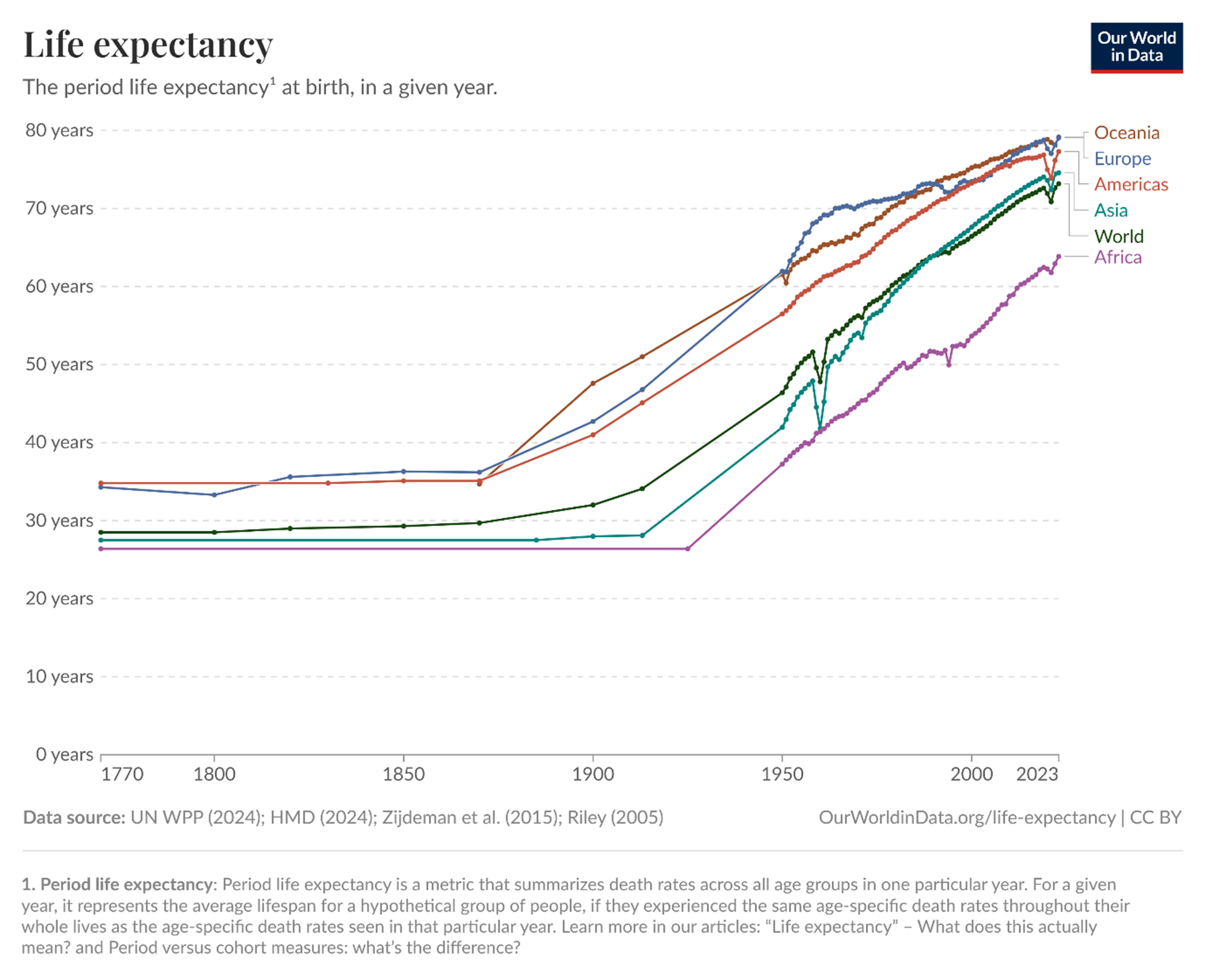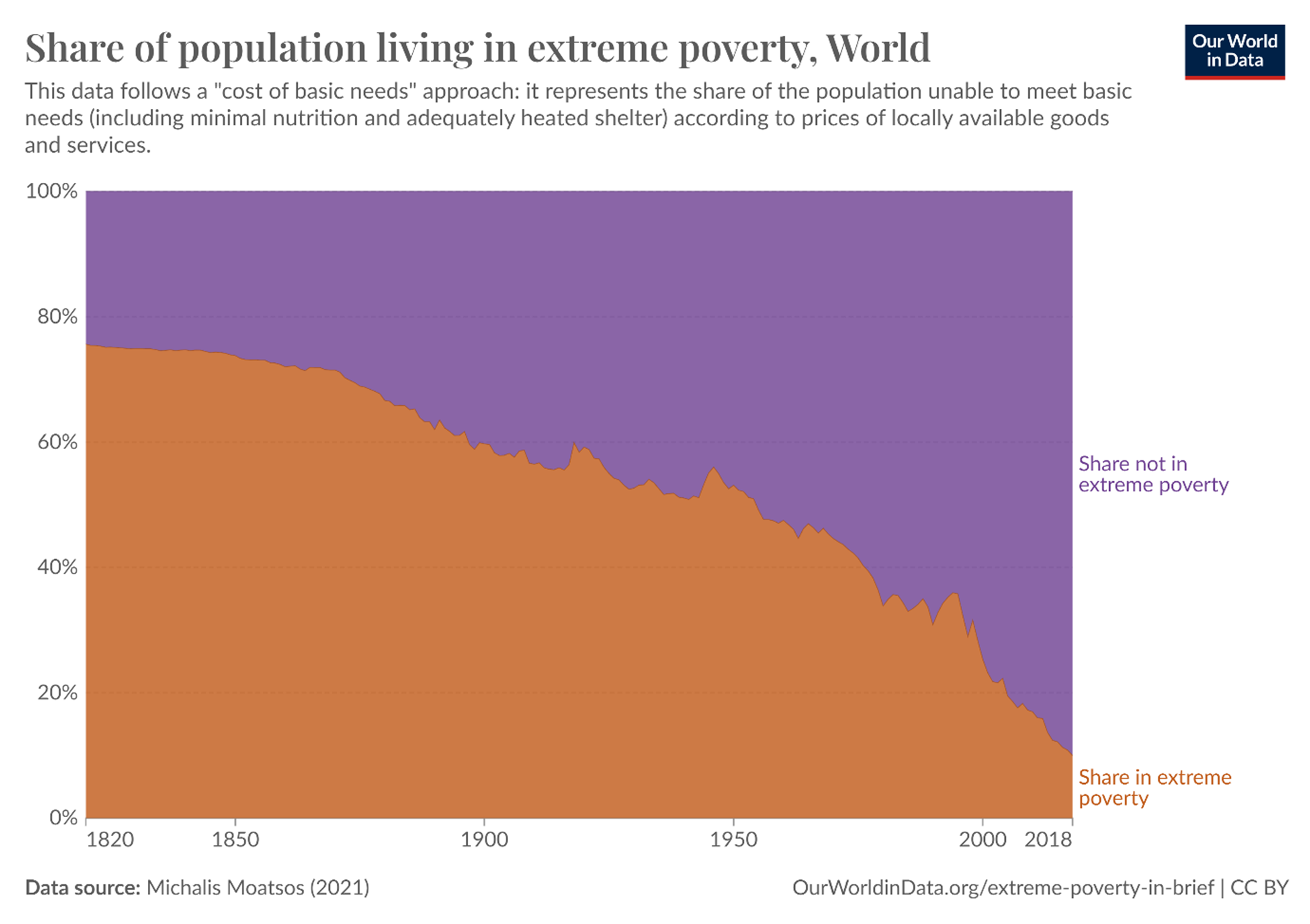Our Earth is degenerate in these later days. There are signs that the world is speedily coming to an end. Bribery and corruption are common. Children no longer obey their parents. Every man wants to write a book and the end of the world is evidently approaching.
—An apocryphal clay tablet from Assyria, dated around 2800 BC
Today, I want to talk to you about the P-word.
Pessimism.
Every millennium, every century, every generation — you will always find this sentiment to be lurking right there.
Pessimism.

Source: Image by vocablitz from Pixabay
Let’s face it. There has never been a shortage of people expressing their negativity about the state of the world:
- Their thought process is always the same. It tends to go like this: ‘This is the worst time in history to be living in. The situation is awful today. And it’s going to get worse in the future. God help us all.’
- Now, so far as I can tell, there has never been a time when people did not think like this. Naturally enough, everyone assumes that the era that they’re living in is uniquely disastrous. Totally screwed up. Beyond redemption.
I have observed that such pessimism can make people dislike their present circumstances. Maybe even hate it. But are such emotions actually justified?
- These days, we’re seeing a steady rise of social-justice warriors. They spend all their time engaging in the politics of grievance. Their logic usually goes like this: ‘There’s so much racial oppression in today’s world. There’s so much discrimination. It’s evil. We need to sort it out urgently.’
- Now, of course, I don’t doubt the strength of their conviction. Nor do I doubt the intensity of their ideology. However, is their pessimism about the present day actually misplaced? Perhaps even ill-informed?
- Let me be frank here. I’m an immigrant. I come from a Malaysian-Chinese background. This means that I’m a member of a racial minority in New Zealand.
- But I will tell you this: as an Asian person, I’m actually living a much better life today compared to the average European person 100 years ago.
- Does this statement sound controversial to you? Well, it shouldn’t be.

Source: Our World in Data

Source: Our World in Data
For the sake of perspective, I think it can be helpful to take a look at the long-term data. It’s stunning to consider how far we’ve come:
- In 1900, the average life expectancy globally was only 32 years of age. Even in Europe, which was relatively advanced, the average life expectancy at the time was only 42. But today? Well, today, the average life expectancy globally has climbed to just over 73. And guess what? It’s still climbing.
- The welfare of children, in particular, is worth considering. In 1900, 40% of children died before their fifth birthday. Today, that number has fallen to 4%. And guess what? It’s still falling.
- The welfare of society, in general, is also worth considering. In 1900, almost 60% of the world lived in absolute poverty. Today, that number has fallen to 10%. And guess what? It’s still falling.
I believe it’s important to grasp the big picture here. Because that’s the only way we can understand long-term trends:
- Even the poorest coloured person living in New Zealand today is actually living a life of luxury and privilege compared to what the average white person would have had a century ago.
- Indeed, regardless of your perception of discrimination, life is objectively better for everyone today. This is true right across the social spectrum.
- Everyone has unprecedented access to food, healthcare, education, the internet. Never in the 5,000-year written history of mankind has this ever been true. Until now.
- Today, by my estimation, human misery is at its lowest level, while human well-being is at its highest level.

Source: Brian Feroldi / X
Of course, it can be very hard to convince the social-justice warriors that life today is positive. They will stubbornly dig in their heels. They will continue to insist that life is unfair. The situation is getting worse, not better:
- Perhaps it’s fashionable for social-justice warriors to be pessimistic. They seem to be celebrated for delivering a pessimistic message. The more pessimistic, the better.
- But what happens if you choose to counter that with an optimistic message? Well, watch out. You risk being accused as not being woke enough. You risk being accused of being blind to oppression.
- How come? Well, it goes without saying that we live in an age of angertainment and drama-queening now. Because of 24/7 streaming media, it’s never been easier to indulge in ideological fire and fury.
- Steve Bannon, the media strategist, had a fitting term for this. He called it ‘flooding the zone’. It just means that 99% of the news we consume these days is really junk food. It has no nutritional value. It stirs up our emotions, yes — but it doesn’t actually add to our quality of life.
But let’s look past the rage-baiting. Let’s look past the outrage. Once you do so, a simple and obvious truth comes into focus:
- We are actually living in the fairest, most prosperous time in human history. Does this statement sound controversial to you? Well, it shouldn’t be.
- Just consider this quote from science-fiction author Arthur C. Clarke. He said: ‘Any sufficiently advanced technology is indistinguishable from magic.’
- Now, given the state of innovation today, you might argue that we are actually living in the most magical time ever.
- For instance, even the poorest nations in the world today have access to the technological marvel known as air-conditioning. This is something that even the richest nations did not have access to just a century ago.
- Astonishing? Absolutely.
So, ultimately, here’s what I believe:
- The news is not a good barometer of truth. It is, however, a good barometer of sentiment.
- The news is not optimised for facts. It is, however, optimised for engagement.
- Many social-justice warriors tend to gravitate to media work. Why? Because they fail to hold a proper job elsewhere. In no other profession (except maybe politics) would a person ever be rewarded for lying all the time.
- So, if you want a sense of rational context, don’t talk to a social-justice warrior. Talk to a historian instead (preferably a fair and balanced one). You’ll be surprised at how much more positive you might end up feeling about the state of the world.
It’s time to have your say
I hope that you’ve enjoyed reading our articles as much as we’ve enjoyed writing them:
- Your prosperity is our focus — which is why we are always working hard to uncover new opportunities beyond the radar for you.
By the way, I have a small favour to ask:
- Would you like to write a review of our work here at Wealth Morning?
- Do you want to let us know if our stories have inspired you in a positive way?
- Do you want to let us know if our stories have helped you become a more successful investor?
We truly value your feedback It encourages us. It helps us to do better. It helps us to reach further:
- So, if you’d like to leave us a review, it’s quick and easy. It will only take two minutes of your time.
- Thank you so much in advance for your kindness and generosity. Your readership keeps us going!
Regards,
John Ling
Analyst, Wealth Morning
(This article is the author’s personal opinion and commentary only. It is general in nature and should not be construed as any financial or investment advice. Wealth Morning offers Managed Account Services for Wholesale or Eligible investors as defined in the Financial Markets Conduct Act 2013.)





John is the Chief Investment Officer at Wealth Morning. His responsibilities include trading, client service, and compliance. He is an experienced investor and portfolio manager, trading both on his own account and assisting with high net-worth clients. In addition to contributing financial and geopolitical articles to this site, John is a bestselling author in his own right. His international thrillers have appeared on the USA Today and Amazon bestseller lists.